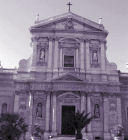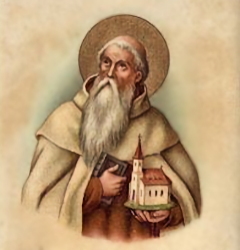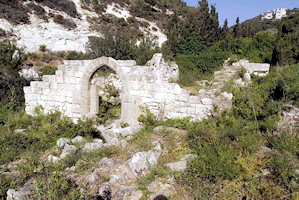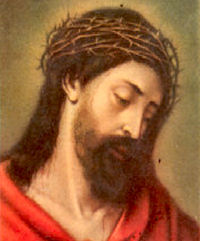Lent: March 29th
Saturday of the Third Week of Lent
Other Commemorations: Bl. Berthold of Mount Carmel (RM) ; Other Titles: Berthold of Calabria
» Enjoy our Liturgical Seasons series of e-books!
The gifts received by us from God are derived not from ourselves but from the Holy Spirit, and are to be used, in a spirit of humility, in the service of the Church and of our brothers.
The parable of the Pharisee and the Publican is a striking reminder that we have no grounds for self-satisfaction. There are two classes of men, said Pascal: saints, who consider themselves guilty of every fault, and sinners, who do not feel guilty of anything. The former are humble and God will exalt them; the latter are proud and will be humbled by punishment. Going even deeper, St. Irenaeus defined man as "the receptacle of God's gifts."
God is not content with calling on us to observe His commandments; He gives us His Holy Spirit to transform our lives and make them truly Christian. —St. Andrew Daily Missal
The Roman Martyrology honors Blessed Berthold of Mount Carmel (d. 1195). He was a soldier who fought in the Crusades. Following a vision of Christ, Bertold gave up the military life and became a hermit on Mount Carmel, trying to live like Elijah the Prophet. His community gave inspiration for the founding of the Carmelites.
Meditation for Saturday of the Third Week of Lent—Confession
Fifty years ago, Saturday was the day when many Catholics “went to confession,” which meant acknowledging the sins and failures of the past week, accepting a penance (usually in the form of a brief series of prayers), and then receiving sacramental absolution. The practice of “going to confession” has decreased dramatically throughout the Catholic world over the past half-century, despite the Church’s efforts to make it more accessible and less threatening (which it rarely was, the mythology surrounding the dark confessional notwithstanding). At precisely the time in Western culture when various forms of psychotherapy are flourishing, Catholics have increasingly abandoned the ancient forms of cleansing guilt to which they once came readily. A diminished sense of sin surely has something to do with this anomaly. So, perhaps, does a too-easy sense of familiarity with holy things, such that twenty-first-century postmoderns do not feel any need to be cleansed before approaching the Lord. Both attitudes deserve reexamination during the pilgrimage of Lent.
In his 1984 postsynodal apostolic exhortation, Reconcilatio et Paenitentia, Pope John Paul II characteristically tried to reframe the Church’s thinking about “going to confession” and receiving the Sacrament of Penance: what sometimes seemed a strange or arcane Catholic practice, John Paul proposed, should in fact be understood in terms of the personal drama of every human life, which is the drama of freedom. Taking freedom seriously means taking the abuse of freedom, which is sin, seriously. And to take sin seriously requires us to name the wounds in our lives as the first step toward their being healed. Thus, John Paul taught, the very fact of someone kneeling to name the wounds he or she bears adds to that man’s or woman’s human dignity. Confession of sins, far from being demeaning or dehumanizing, is liberating and ennobling.
Regular confession of sins is also, the pope suggested, an essential part of configuring oneself to Christ, for the Cross of Christ is the fountainhead from which all reconciliation between God and humanity flows. Indeed, the very geometry of the Cross expresses the two dimensions of the reconciliation every sensitive soul seeks: the vertical beam symbolizes our need for reconciliation with God, while the horizontal crossbeam represents the imperative of God for the guilt we carry along the journey of life; the human family craves reconciliation within itself. Both aspirations are embodied in the cross.
In an interview with a local newspaper in 2011, Cardinal Francis E. George, OMI, the archbishop of Chicago, said that he intended to devote more of his priestly life to the ministry of the confessional as he entered his meridian seventies. “The most important conversations on the planet take place in the confessional,” the cardinal said. It’s where you have a soul who bares who they are before God and you’re witness to that. It’s God who forgives, but you’re witness to that and you try to assist. If [I] can do that well for just a few people, I’ll be able to tell the Lord…I did a few things right anyway.” And those penitents will be able to approach the glory of the Lord cleansed, like Moses, Aaron, and the priests of the Old Covenant.
—George Weigel, Roman Pilgrimage: The Station Churches

Saturday of the Third Week of Lent
Station with Santa Susanna (St. Susan):
The Station is in the church of St. Susanna, virgin and martyr of Rome. The first Christian place of worship was built here in the 4th century. It was probably the titulus of Pope Caius (283-296). Caius was St. Susanna's uncle, and tradition claims that the church stands on the site of her martyrdom. The church is now the national parish of the United States since 1922.
As of 2019, there is a temporary closure. Currently the substitute Station Church is S. Maria della Vittoria (St. Mary of Victory).
For more on Santa Susanna, see:
- Churches of Rome
- The Station Churches of Rome
- Rome Art Lover
- Roman Churches
- PNAC
- Aleteia
- Station Church
- The Catholic Traveler
For more on S. Maria della Vittoria, see:
For further information on the Station Churches, see The Stational Church.
Bl. Berthold of Mt. Carmel
 Blessed Berthold seems to have had a connection with the beginnings of the Carmelite Order. He was a relative of Aymeric, the Latin patriarch of Antioch who was installed in Antioch during the crusades. At the time, there were a number of hermits from the West scattered throughout Palestine, and Berthold gathered them together, founded a community of priests who settled on Mount Carmel, and became their first superior.
Blessed Berthold seems to have had a connection with the beginnings of the Carmelite Order. He was a relative of Aymeric, the Latin patriarch of Antioch who was installed in Antioch during the crusades. At the time, there were a number of hermits from the West scattered throughout Palestine, and Berthold gathered them together, founded a community of priests who settled on Mount Carmel, and became their first superior.
There is a legend that he was born at Limoges in France, studied in Paris, and was ordained a priest there. According to the legend, he accompanied Aymeric on the crusades and found himself in Antioch when it was being besieged by the Saracens. Through his urgings, the Christians in Antioch turned to prayer and penance, and the city was delivered.
What is known for certain is that Bl. Berthold directed the building of a monastery and church on Mount Carmel and dedicated the church in honor of the prophet Elias, who had defeated the priests of Baal there and seen the vision of the cloud out over the sea. This is confirmed in a letter of Peter Emilianus to King Edward I of England in 1282.
 Berthold lived out his days on Mount Carmel, ruling the community he had founded for forty-five years until his death about 1195. His example and way of life stamped the beginnings of the Carmelite Order, leading to the drawing up of the order’s rule by St. Albert, Latin patriarch of Jerusalem, about 1210. That rule was approved by Pope Honorius III in 1226 and it is this primitive rule that is considered the foundation of the Order of Mount Carmel.
Berthold lived out his days on Mount Carmel, ruling the community he had founded for forty-five years until his death about 1195. His example and way of life stamped the beginnings of the Carmelite Order, leading to the drawing up of the order’s rule by St. Albert, Latin patriarch of Jerusalem, about 1210. That rule was approved by Pope Honorius III in 1226 and it is this primitive rule that is considered the foundation of the Order of Mount Carmel.
But it seems to have been Berthold who first organized the monastic life of the hermits on Mount Carmel and governed them until his death. St. Brocard, who apparently was his successor, petitioned Albert to compose a rule for them, undoubtedly codifying and completing the work begun by Berthold.
—Taken from ucatholic.com
Highlights and Things to Do:
- Read more about Bl. Berthold:
- Read more about about the Order of Carmel: On the History and Spirit of Carmel.






